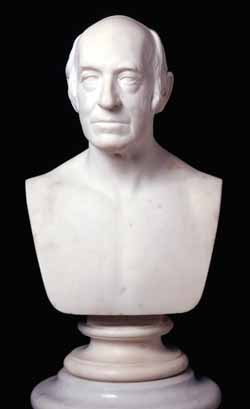William Lloyd Garrison
William Lloyd Garrison (December 10, 1805 – May 24, 1879) was a prominent American abolitionist, journalist, and social reformer. He is best known for his editorship of the abolitionist newspaper The Liberator, and for his founding of the American Anti-Slavery Society. Garrison was one of the most vocal advocates for the immediate abolition of slavery in the United States.
Early Life[edit | edit source]
William Lloyd Garrison was born in Newburyport, Massachusetts, on December 10, 1805. His experience with poverty and his father's desertion of the family influenced his later views and activism. Garrison's formal education was limited, but he was apprenticed to a local printer, which introduced him to the world of publishing and reform movements.
Career[edit | edit source]
In 1828, Garrison began working for the National Philanthropist, a newspaper dedicated to the temperance movement. His experiences there and with other reformist publications helped shape his fervent opposition to slavery. In 1831, Garrison launched The Liberator in Boston, which would become one of the most influential anti-slavery publications in the pre-Civil War era. Through The Liberator, Garrison advocated for the immediate emancipation of all enslaved people, a radical stance at the time.
Garrison's activism was not limited to his journalism. In 1833, he helped found the American Anti-Slavery Society, which sought to end slavery through moral persuasion and nonviolent resistance. Garrison's approach to abolition was controversial, even among other abolitionists. He was a proponent of pacifism, women's suffrage, and equal rights for African Americans, which led to conflicts within the abolitionist movement.
Controversies and Challenges[edit | edit source]
Garrison's advocacy for immediate abolition and equal rights for African Americans drew significant opposition. He was often threatened with violence, and in 1835, a mob dragged him through the streets of Boston. Despite these challenges, Garrison remained committed to his cause, using The Liberator as a platform to denounce slavery and call for social reform.
Garrison's views on the United States Constitution also sparked controversy. He believed the Constitution was a pro-slavery document and famously burned a copy of it during a Fourth of July speech, declaring it "a covenant with death and an agreement with Hell."
Later Life and Legacy[edit | edit source]
After the American Civil War and the abolition of slavery with the Thirteenth Amendment to the United States Constitution, Garrison ended the publication of The Liberator in 1865. He continued to advocate for civil rights and women's suffrage until his death in New York City on May 24, 1879.
William Lloyd Garrison's legacy is that of a radical reformer whose unwavering commitment to justice and equality helped change the course of American history. His methods and beliefs, particularly his emphasis on immediate emancipation and equal rights, influenced future generations of activists.
Search WikiMD
Ad.Tired of being Overweight? Try W8MD's physician weight loss program.
Semaglutide (Ozempic / Wegovy and Tirzepatide (Mounjaro / Zepbound) available.
Advertise on WikiMD
|
WikiMD's Wellness Encyclopedia |
| Let Food Be Thy Medicine Medicine Thy Food - Hippocrates |
Translate this page: - East Asian
中文,
日本,
한국어,
South Asian
हिन्दी,
தமிழ்,
తెలుగు,
Urdu,
ಕನ್ನಡ,
Southeast Asian
Indonesian,
Vietnamese,
Thai,
မြန်မာဘာသာ,
বাংলা
European
español,
Deutsch,
français,
Greek,
português do Brasil,
polski,
română,
русский,
Nederlands,
norsk,
svenska,
suomi,
Italian
Middle Eastern & African
عربى,
Turkish,
Persian,
Hebrew,
Afrikaans,
isiZulu,
Kiswahili,
Other
Bulgarian,
Hungarian,
Czech,
Swedish,
മലയാളം,
मराठी,
ਪੰਜਾਬੀ,
ગુજરાતી,
Portuguese,
Ukrainian
Medical Disclaimer: WikiMD is not a substitute for professional medical advice. The information on WikiMD is provided as an information resource only, may be incorrect, outdated or misleading, and is not to be used or relied on for any diagnostic or treatment purposes. Please consult your health care provider before making any healthcare decisions or for guidance about a specific medical condition. WikiMD expressly disclaims responsibility, and shall have no liability, for any damages, loss, injury, or liability whatsoever suffered as a result of your reliance on the information contained in this site. By visiting this site you agree to the foregoing terms and conditions, which may from time to time be changed or supplemented by WikiMD. If you do not agree to the foregoing terms and conditions, you should not enter or use this site. See full disclaimer.
Credits:Most images are courtesy of Wikimedia commons, and templates, categories Wikipedia, licensed under CC BY SA or similar.
Contributors: Prab R. Tumpati, MD






